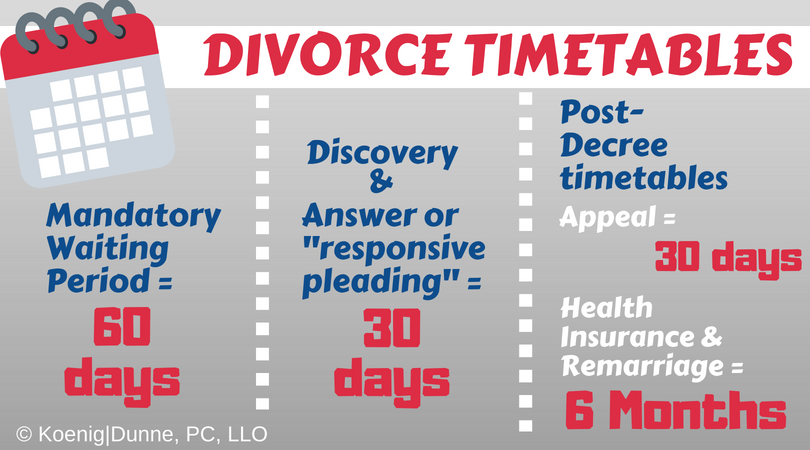Nearly all phases of your divorce will be accompanied by timelines providing when certain actions must be taken or prohibiting certain actions from being taken. The following are some common timelines to help you decipher what must be done during your divorce and when.
- Mandatory waiting period
What is it?
Under Nebraska law, no divorce can be final until 60 days after service of process has been perfected.
What’s the timetable?
Your divorce starts with one spouse filing a complaint for dissolution of marriage. After that document is filed with the court, it must be “served” on the other spouse. Once the other spouse receives the complaint from the sheriff or enters his or her voluntary appearance, a 60-day clock starts ticking.
Your divorce cannot be final during those 60 days. However, you can work with your attorney and your soon-to-be former spouse to negotiate or work towards settlement. If you and your spouse settle all the issues and sign a decree, you may deliver that decree to the judge no sooner than 61 days after service was perfected.
- Answer or “responsive pleading”
What is it?
An answer or responsive pleading (usually an answer and counterclaim for dissolution of marriage) is a document that is filed in response to the complaint for dissolution of marriage.
What’s the timetable?
If your spouse filed for divorce and served with you the complaint, you have 30 days after being served (or filing your voluntary appearance) to respond to the complaint.
- Discovery
What is it?
Discovery is the formal exchange of information during the divorce process. The most common forms are interrogatories (written questions that must be answered in writing and under oath) and requests for production of documents.
What’s the timetable?
The Nebraska Rules of Discovery direct that once interrogatories and requests for production of documents have been received by a party, that party has 30 days to respond to them. If your 30 days are up and you have not provided your spouse with the responses, your discovery will be considered past-due, and you can anticipate opposing counsel filing a motion to compel your response. If you know you will need more time to respond, your attorney may need to seek an extension from opposing counsel.
- Post-decree timetables
A divorce decree is final once the judge signs it. You will be considered “divorced” as of that date. However, there are certain timetables that extend past the date your judge signs your decree that you should keep in mind.
Appeals timetable
After the judge signs your decree, a 30-day clock starts running during which time either party may file a notice of appeal. For purposes of appeal only, your divorce will not be considered final for 30 days after the judge signs your decree.
Health insurance timetable
If either you or your spouse is ordered to carry the other on his or her health insurance for six months after the decree is entered, for purposes of health insurance only, your decree will not be considered final for six months after the judge signs it.
Remarriage timetable
After the judge signs your decree, a six-month period begins during which time neither party may remarry anyone anywhere in the world.
Your divorce will involve many moving pieces and timelines to keep in mind. Your experienced Koenig│Dunne family law attorneys will help you make sense of and stay on top of these timetables.

